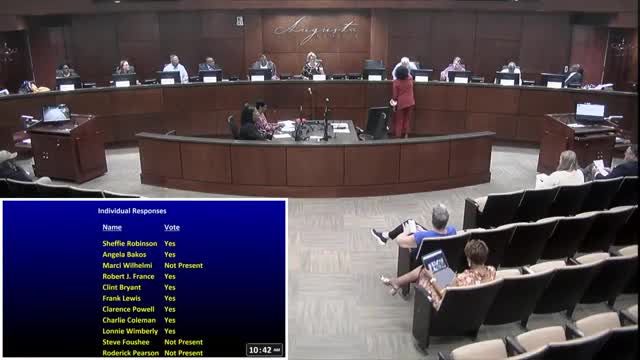Committee debates ethics board, internal audit and manager qualifications during charter review
Get AI-powered insights, summaries, and transcripts
Subscribe
Summary
Consultants and committee members discussed whether to place ethics requirements in the charter or ordinances, the composition and powers of an ethics board, internal-audit language and manager qualifications including ICMA credentialing.
Consultants from the Carl Vinson Institute of Government and committee members discussed several charter elements related to ethics, transparency, internal audit and qualifications for a future city/county manager.
Dr. Facer, speaking for the consultants, outlined options for the charter and accompanying ordinances. He said the charter could mandate a code of ethics and the creation of an ethics board while leaving detailed enforcement mechanisms to ordinances so the rules could be updated without returning to a referendum. "This provision shows that the Charter is serious about the need for dealing with ethics, but at the same time leaves it to the council or commission to adopt the formulation most appropriate for the specific situation," Dr. Facer said. He noted the Georgia Municipal Association (GMA) program "Certified City of Ethics" and said Augusta currently meets that certification.
The consultant team reported that among cities over 50,000 and counties over 100,000 in Georgia, about 86% have a formal code of ethics; many jurisdictions place ethical review within existing bodies while others create a separate ethics board. Dr. Facer explained common ethics-code elements: conflicts of interest, rules on hiring relatives, outside employment and campaign donations. On penalties and enforcement the group said most municipal ethics processes end in public reprimand or censure rather than criminal penalties; legal counsel advised the committee that the ethics board itself typically cannot impose criminal sanctions but could recommend disciplinary action to the commission.
Committee members asked whether an ethics board should include legal or human-resources expertise. Attorney McLean said she often sees a community lawyer on such boards; Ms. Backus suggested including HR and judiciary knowledge during implementation. The committee also discussed whether ethics boards could possess subpoena power; counsel said that question would require further legal review.
On internal auditing, the consultants noted that internal-audit functions are common but not universal: roughly 62 counties and about 57% of cities reported some internal-audit capacity in their review. The American Association of Local Government Auditors recently sent a letter endorsing the committee's internal-audit recommendation, the consultants said. Several members argued an internal auditor could play a watchdog role to enforce charter and ordinance provisions rather than leave enforcement solely to elected officials.
Committee member Mr. Powell moved to recommend adding an internal-audit department to the charter; Mr. Coleman seconded. The meeting record shows the motion was made and discussion occurred but the transcript does not include a recorded final tally for that motion in this excerpt.
Members also discussed qualifications for a future manager. The consultants described the ICMA (International City/County Management Association) credentialing process for managers, including eligibility requirements, assessment and ongoing professional development. A committee member asked whether the charter could require that a chief administrative officer obtain ICMA credentialing within a set period; the consultants said they had discussed options but that mandating credentialing is less common and would require further consideration.
Committee members debated compensation and time expectations for commissioners. Some members said the current part-time structure and near-$30,000 total compensation (including allowances) shape who can serve and whether the city should expect full-time engagement or office hours from commissioners. Several members urged balancing expectations for commissioners against pay and the desire to recruit younger and working professionals.
Ending: The ethics and internal-audit subjects were left for further drafting and legal review; counsel and consultants will refine recommended language and report back, and the internal-audit recommendation will be placed for formal consideration on an upcoming agenda where the committee will record a vote.
